Backlinks are one of those SEO terms that come up a lot, but rarely get explained in a way that actually feels useful, especially for therapists. You’re often told they’re important, but not why, which ones matter, or whether you should even be worrying about them at all.
Simply put, a backlink is when another website links to yours. For therapy practices, these links help signal trust, credibility, and relevance, not just to Google, but increasingly to AI-driven search results as well. That said, more links doesn’t automatically mean better SEO. In fact, focusing on the wrong types of backlinks can be a waste of time (or even hurt your site).
In this post, I’m going to break down what backlinks actually do, which ones are worth prioritizing as a therapist, and where it makes sense to get listed online. The goal here isn’t to overwhelm you or push SEO “hacks,” but to give you a clear framework you can use, whether you’re handling your site yourself or working with an SEO team.
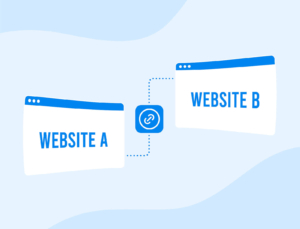
What Do Backlinks Do For Therapists?
For therapy websites, backlinks play a big role in establishing credibility and trust. When reputable, relevant websites link to yours, it helps search engines and AI-driven search tools understand that your practice is legitimate, professional, and connected to the larger mental health space.
This matters even more for mental health content, which falls under what Google considers Your Money or Your Life (YMYL). Because these topics impact people’s health and well-being, search engines are more cautious about which sites they surface. Backlinks from established therapy directories, professional organizations, and trusted community resources help reinforce that your practice is a reliable source of care.
Backlinks also support local visibility. Listings on therapist directories, Google Business Profile, and local organizations help tie your website to a specific geographic area. This is one of the ways backlinks contribute to “therapy near me” searches, even if the link itself isn’t driving a lot of direct traffic.
What Makes a “Good” Backlink for Therapists
The key thing to understand is that backlinks work best when they’re relevant. A small number of high-quality links from mental health–related or local sources will typically have a much greater impact than a large number of unrelated links. For therapists, the focus should be on alignment and legitimacy, not volume.
Not all backlinks are helpful, and this is where a lot of confusion (and bad advice) tends to show up. For therapists, a good backlink comes down to a few simple factors: relevance, credibility, and context.
Relevance matters first. A link from a mental health directory, a professional organization, or a local community resource is far more valuable than a link from an unrelated blog or random website. Search engines and AI tools look at whether the site linking to you actually makes sense. We don’t need a tax accounting company linking to a functional medicine website.
Credibility is the second piece. Well-known platforms, established directories, and professional networks carry more weight than low-quality or generic listing sites. This doesn’t mean the site has to be huge or national, iit just needs to be legitimate and trusted within its space.
Context also plays a role. A backlink works best when your practice is clearly described and linked within meaningful content, rather than just listed by name with no explanation. When it’s clear why your site is being linked, it helps reinforce your expertise and focus.
If you’re ever unsure about a backlink opportunity, a good rule of thumb is to ask: Would this link make sense to a potential client reading it? If the answer is yes, it’s likely a backlink worth having.
Backlinks Therapists Should Avoid
Some backlinks can do more harm than good. In general, it’s best to avoid paid link packages, bulk directories that have nothing to do with mental health, or sites that exist only to list hundreds of unrelated businesses. These types of links don’t add credibility and can create confusion about what your site is actually about.
If a backlink opportunity feels spammy, rushed, or overly focused on “SEO value” instead of real visibility or connection, it’s usually a sign to skip it.

Therapist Directories & Listings
For most therapists, directories and professional listings are the most practical and effective way to build strong backlinks. These links come from relevant, trusted platforms and clearly signal to search engines that your practice is part of the mental health field.
Having your practice in the right directories also supports local visibility and makes it easier for potential clients to find and verify your practice across platforms.
Below are some of the main types of directories worth prioritizing.
Therapy & Mental Health Directories
These are some of the most valuable backlinks for therapists because they’re directly relevant and widely recognized in the mental health space. Listings on these platforms help reinforce your credibility and make it easier for both search engines and clients to understand what you offer.
Common examples include therapist directories like TherapyDen, GoodTherapy, Mental Health Match, Zencare, Inclusive Therapists, and Open Path Psychotherapy Collective. If your practice is on these platforms, it’s important that your profile is complete, accurate, and links back to the most relevant page on your website, not just your homepage by default.
Local & Professional Directories
Local and professional directories help connect your practice to a specific geographic area, which is especially important for “therapy near me” searches. These backlinks support local SEO and reinforce that your practice is a real, established business in your community.
This can include your Google Business Profile, local chamber of commerce listings, city or county business directories, state psychological associations, and even alumni directories from schools or training programs. These are often overlooked but can be surprisingly valuable when they’re relevant and well-maintained.
Niche & Identity-Based Directories
Niche directories are especially helpful when you work with specific populations or specialize in particular areas of care. These listings add clarity around who you serve and can strengthen both SEO and client trust.
Examples might include directories focused on women’s mental health, trauma-informed care, LGBTQ+ affirming therapists, neurodiversity-affirming providers, or culturally specific therapist networks. When these directories align with your actual services and approach, they help reinforce your expertise in a meaningful way.
Final Thoughts from an SEO Specialist
Backlinks don’t need to be complicated or aggressive to be effective. For therapists, the most helpful links are the ones that make sense. For example, directories, professional listings, and community resources that clearly reflect who you are and the work you do.
If you’re linked in the right places and your website clearly communicates your services, backlinks naturally support your visibility, credibility, and trust online. You don’t need hundreds of links or complicated strategies. A small number of relevant, well-aligned backlinks can go a long way.
If you’re unsure which links are helping, which ones might be outdated, or where it makes sense to be listed next, that’s a normal place to be. SEO works best when it’s intentional and built over time, not rushed.
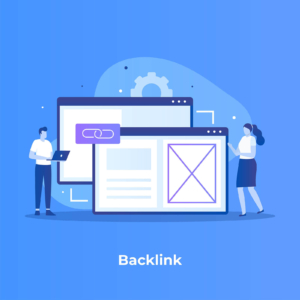
Not Sure Where Your Backlinks Stand?
At Simplified SEO, we help therapists understand what’s working and what’s outdated. Our specialists can help you discover real opportunities to improve visibility, without overwhelm or guesswork. A thoughtful SEO review can help bring clarity and direction.
If you’re feeling unsure about backlinks, directories, or how all of this fits into your broader SEO strategy, you don’t have to figure it out alone. Our approach in everything we do is grounded in ethical, sustainable SEO, not shortcuts or one-size-fits-all tactics.
Get in touch
If you want to learn more about how backlinks work, you can contact us here to learn more about our packages.
Explore our blog
Looking for more clarity around SEO, content, or sustainable marketing for therapists? Explore our blog for additional insights and guidance.
Stay connected
Follow us on social media for ongoing reflections, reminders, and updates, without the pressure to do everything at once.
Other Services to Support Your Growth
At Simplified SEO Consulting, we offer a variety of services to meet you exactly where you are. Want a one-on-one approach? We have that. Prefer to hand it off to the professionals? That too!
Our Done-for-You SEO Services are ideal for helping professionals who want to improve their Google rankings without having to learn SEO themselves. We take care of everything, from optimizing your website to crafting keyword-rich content, so you can focus on your clients.
Prefer a more self-paced approach? Our DIY SEO Courses are built specifically for therapists and wellness professionals. You’ll learn practical, proven strategies to optimize your website at your own pace, with support from instructors who speak your language.
Need help with behind-the-scenes improvements? Our Technical SEO Services address the foundational pieces that impact how search engines crawl and rank your site. Examples: site speed, mobile optimization, and metadata.
Our social media management package helps therapists maintain a consistent, professional presence across platforms while keeping messaging grounded, human, and supportive.
And if words aren’t your thing, we’ve got you covered. Our SEO Copywriting Services combine compelling, human-first language with keyword strategy to help you rank in Google and connect with your ideal clients.
About the Author
Olivia Ferguson is the Social Media Specialist at Simplified SEO Consulting. She helps private practice owners and helping professionals grow their online presence with strategic, story-driven content. Olivia graduated with a social work degree from Central Michigan University. She combines her passion for mental health with a love for marketing that actually feels human.

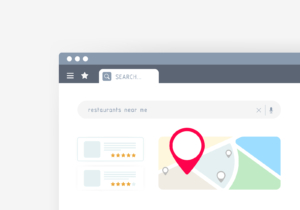
 Fill Out Your Profile Completely
Fill Out Your Profile Completely These posts:
These posts: Sterling Humburg-Cage graduated from the University of Missouri with a BA in Psychology in 2020. He has integrated what he learned in school into his work as an SEO Specialist with Simplified SEO Consulting. Sterling prides himself on helping current clients & alumni solve difficult issues. He’s great at giving clients multiple options about how to approach a situation, finding solutions to some of the more technical aspects of SEO, and responding in a timely manner to client concerns. Since he started, Sterling has met frequently with our alumni and provided them with extra problem-solving support. He now provides additional support with a variety of local SEO services. He often goes the extra mile to do outside research. By doing so, he ensures private practice owners have everything they need to rank well on search engines long-term for the keywords their ideal clients are using!
Sterling Humburg-Cage graduated from the University of Missouri with a BA in Psychology in 2020. He has integrated what he learned in school into his work as an SEO Specialist with Simplified SEO Consulting. Sterling prides himself on helping current clients & alumni solve difficult issues. He’s great at giving clients multiple options about how to approach a situation, finding solutions to some of the more technical aspects of SEO, and responding in a timely manner to client concerns. Since he started, Sterling has met frequently with our alumni and provided them with extra problem-solving support. He now provides additional support with a variety of local SEO services. He often goes the extra mile to do outside research. By doing so, he ensures private practice owners have everything they need to rank well on search engines long-term for the keywords their ideal clients are using!
















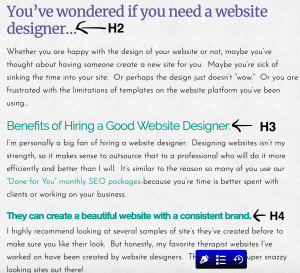

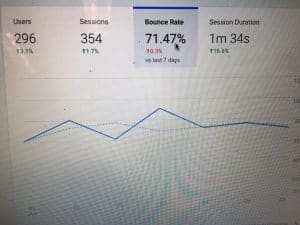
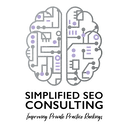 If you are a group practice owner ready to really focus on getting your website found, book a free consultation to discuss how my SEO services might be able to help!
If you are a group practice owner ready to really focus on getting your website found, book a free consultation to discuss how my SEO services might be able to help!